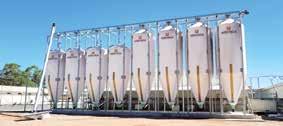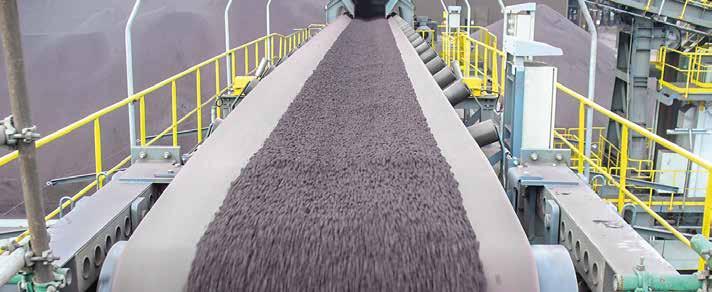
10 minute read
Conveyor and elevator belts for agricultural applications
In today’s world where transportation is perhaps one of the most elements for the business to succeed, people are always in search of better, faster and cost effective technique of transporting, tracking and processing their goods. In the recent years, conveyor belt system has emerged as one of the best ways of transporting products. These belts are specially designed in order to cater the for the needs of the agricultural world.
Advertisement
They are not only cost effective, but also efficient. They have the ability to adjust to any type of temperature. Different conveyor belts are used to perform agriculture applications.
When deciding on which conveyor system best suits your needs, a key consideration is the material being transported. Some important characteristics to consider are size, flowability, abrasiveness, corrosiveness, moisture content, and the temperature at which it must be kept. The composition of the material, if powders, granules, pellets, fibers, or flakes are being conveyed, should also be considered, along with the particle size, weight, and density.
The function of the conveyor system itself may vary. The two main categories of moving material through a process are conveying and feeding. Conveying is the moving of materials from one or more pickup points to one or more drop points. The desired window of time for this movement should be considered, as well as the amount of pickup and drop points, the amount of material being moved, and whether or not cross-contamination between multiple materials is a concern. Feeding is more time sensitive and requires more precise systems than conveying. Material is usually moved from one pickup point to one drop point. The product being moved may have to be delivered in batches, or at a controlled, continuous rate. An essential factor to consider before the selection of a conveyor system is the environment in which it will be used.
High humidity, temperature, vibration, pressure, fragile or hazardous materials, and flammable products in the facility should all be discussed with a conveyor manufacturer to determine any potential risks and the countermeasures and workarounds needed. The size of the system compared to how much room in the workspace is available should be considered, along with how it will fit alongside existing equipment.
Conveyors systems are often relatively complex in their design and construction owing to their large scales and integration into different factory processes. Still, the modular nature of many conveyor components makes even long and complex systems readily achievable. Manufacturers of such systems can offer design assistance so that the conveyor suits the workspace.
Uses of Conveyor in the agricultural community
The uses of a conveyor belt in the agricultural community are numerous. It is used in the feeding process that processes or freezes vegetables, fruits, and other agricultural products for packing to be sent to the retailers or other process plants. Besides this, these belts are effectively being used for loading bulk quantities into trucks in order to get them transported to their final destination. Bean market is another place, where conveyor belt scales are used in a large number. Additionally, these belts are to load out the soy beans into the trucks that carry them to the end process.
These belts are designed to suit the requirements of the agricultural industry application. Sugar Cane, Cauliflower, peas, flour, rice, and grains are some of the agricultural applications that use conveyor belt scales. Other applications include: • Seed coating for vegetable seeds and cereal grains • Chopping of crops • Dust collection • Harvesting • Threshing • Material handling • Storage • Grain processing • Drying of grains • Merits of using the belts in the agricultural industry
With the help of these conveyor belts, the workforce reduces and this leads to more profits and less expense. Also, the storage, drying, and processing of the products have become very efficient and easy.
SIG is one of the European most important manufacturers of rubber conveyor and elevator belts. With an experience of more than 70 years manufacturing SIG can easily supply high quality made in Italy synthetic and steel rubber belts worldwide. Since the end of 60’s, our production plant is based in Gorla Minore, Northern Italy, close to Malpensa Airport and Milan city center. In this 12000 sqm area, you could also find SIG headquarter as all the company key position, from purchasing to commercial and technical teams work all together.
WE MANUFACTURE IN ITALY, WE SUPPLY WORLDWIDE
This specific organization allows all the company workers having a flexible approach to business, satisfying all customer’s needs as well as international market requests. The close cooperation between our technicians and our sales Department members allows SIG to find solutions to any type of problem. Concerning the production process, our factory has a capacity of 400 km every year, manufacturing any type of rubber belt, up to 2200 mm of width and weight for every roll, covering any industrial field, from cement to iron factories, passing through coal power plants, ports and grain terminals, mines and quarries as well as chemical factories.
Specific rubber covers are available to handle the most critic bulk materials like hot clinker, flammable coal, oily waste and fertilizers, grain and cereals, highly abrasive bauxite and iron ore. Here at SIG we love challenges, that is why there is no project nor request that we cannot but satisfy. No matter where you are, we will also find the way to reach you with our best and highquality products. The supply chain is composed by only high qualified suppliers of rubber compounds, synthetic and steel fabrics to assure the highest level of quality with the fastest and most flexible delivery time. Product quality is managed according to codified quality control programs all over the whole production process, from raw material acceptance to delivery of final product.
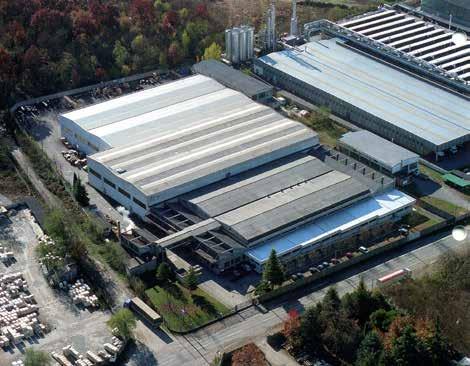
For this purpose and to allow efficient R&D process too, SIG has made, during the years, important investments for the development of its own technological laboratory, provided with the most advanced and reliable equipment which is also available for customer’s needs. Together with a strict control of the quality, SIG gives high attention to the environmental and health properties of the raw materials involved: since 2012, following the European directives, all rubber compounds used by SIG are free from hazardous chemicals, especially PAHs, PolyAromatic Hydrocarbons, granting a limited and lower impact to the environment and to the health of operators than imported products of unknown origin. Our best happiness is our customer satisfaction with our products, this is the reason why we develop and use the latest technologies available to provide you with the most reliable rubber belts. SIG deeply loves its customers, that is why our main concern is taking care of you.
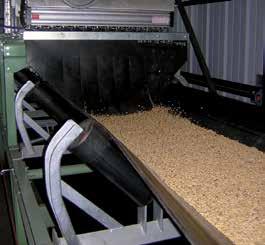
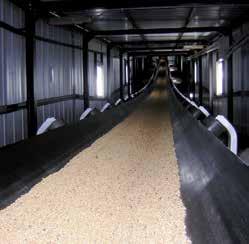
ITALIAN TECHNOLOGY
CONVEYOR & ELEVATOR BELTS
STEEL CORD & TEXTILE
ISO 9001
WE MANUFACTURE IN ITALY TO SUPPLY ALL AROUND THE WORLD
Via A. Colombo, 144 21055 Gorla Minore (VA) - Italy Phone +39 0331 36.51.35 Fax +39 0331 36.52.15 www.sig.it E-mail: sig@sig.it
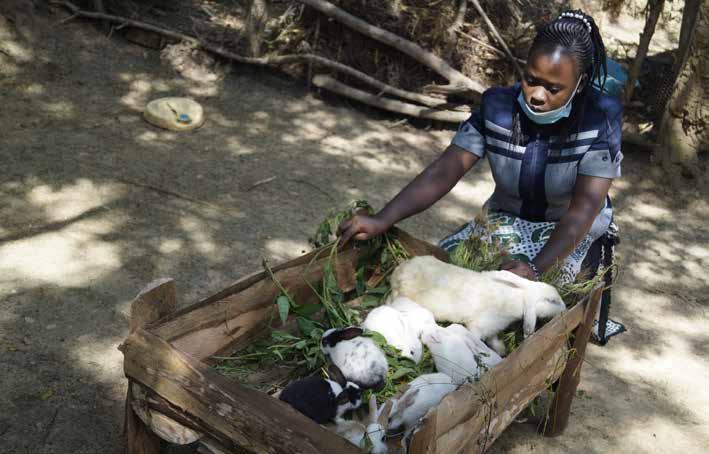
Benedetta Nangila has diversified into rabbits to sustain her fodder business during covid.
Kenyan agriculture entrepreneurs bet on diversification, networking to weather COVID-19 shocks, study
Throughout 2020 and the myriad of challenges brought about by the COVID-19 pandemic, supporting and working with young agribusiness entrepreneurs has been particularly pertinent. To this end, the United States International University-Africa (USIU-A), through support provided by the International Development Research Centre (IDRC) and Australian Centre for International Agricultural Research through their Cultivate Africa’s Future initiative, has been providing young agripreneurs, aged 18-35 years, with access to business training, finance and mentor support. The program, implemented by the USIU-A’s Global Agribusiness Management and Entrepreneurship (GAME) Center, aims to enable Kenyan youths to develop and maintain resilient, job-creating enterprises. At a virtual roundtable event held recently, the results of a recent USIU-A study funded by IDRC to determine the impacts of the pandemic and its gender implications on young entrepreneurs were presented, The event was attended by 14 County Governments, with the keynote address provided by Prof. Anyang’ Nyong’o, Governor of the County Government of Kisumu who recounted how the nationwide curfew and cessation of international travel reignited the need to build resilient local food production systems.
According to the Kenya Agribusiness Strategy (2017-2021), youth (18-34 years) account for 29% of Kenya’s population and are significant to Kenya’s growth and transformation agenda. However, 70-80% of entrepreneurs fail within their first two years of business. With the disruption of agricultural value chains since the onset of the pandemic, USIU-A received additional funding from IDRC to better understand the factors that allow young people to be more resilient and to keep their agribusinesses afloat.
“This rapid response initiative to document changes in real-time, is part of our efforts at IDRC to help inform recovery of policies and reorganizing of food systems during the current crisis but also to help us prepare for future shocks,” explained Kathryn Toure, IDRC Regional Director, Eastern and Southern Africa to roundtable participants.
In total, 874 young men and women active agripreneurs from 31 Counties consented in July 2020 to be involved in the study. With COVID-19
restrictions in place, data was collected from 500 selected respondents via email, WhatsApp and phone, involving monthly monitoring and recording of resilience indicators. While presenting the results, Prof Francis Wambalaba stated that resilience was investigated from two angles. “The first looked at personal resilience including time spent networking, spending on promotions, confidence, and changes made to business plans,” he explained. “Business resilience included reviewing the entrepreneurs’ customer base, sales, jobs and employee welfare, product lines, outlets and technology adoption.”
Consequences of covid-19 crisis
Analysis of the results revealed that by November 2020, 366 (73%) were still in business but by January 2021, this had dropped to 260 (52%) with a 48% failure rate. Of those 264 men and 102 women still active in November, most had high school education and were predominantly self-employed in agribusiness. Strikingly, although perhaps understandably, over 90% were unprepared for the COVID-19 crisis. “I never thought anything like this could happen in my lifetime,” stated Kelly Kadiviria, an agriprenuer from Kakamega County.
During the study, the average entrepreneur laid off two workers and reduced the money spent on wages. “I could no longer afford to keep them (employees)... I just had to let them go,” explained Jared Omondi Andego from Kisumu County. Significant numbers of respondents had to fall back on savings or seek additional support from family or business associations. The impacts of the pandemic seemed to hit female entrepreneurs particularly hard with a much higher chance of failure resulting from reduced customer bases and falling sales. “Our sales decreased sharply…I used to make an average of Ksh. 6,000 a week, now I can hardly make Ksh. 3,000,” added Benedetta Nangila, a fodder farmer from Bungoma County.
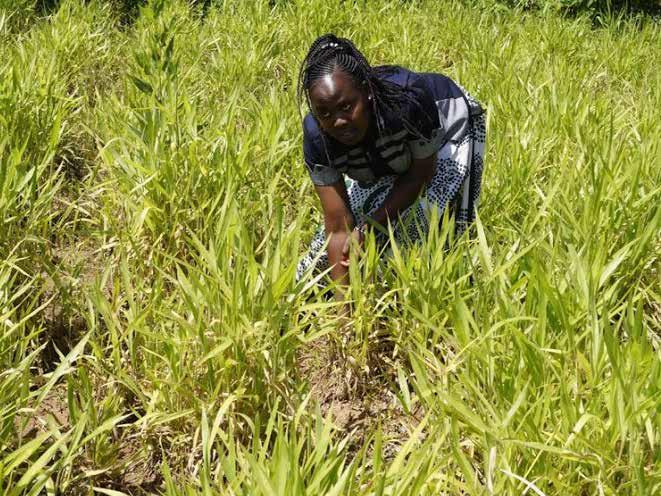
Benedetta Nangila’s Bracharia fodder farm in Bumula, Bungoma County Credit USIU
Building better futures
Nevertheless, more resilient entrepreneurs were shown to have spent more time networking, seeking advice and additional funds, and using social media to increase sales. Diversification was also key to sustaining agribusinesses. The USIU-A training has also provided many of the entrepreneurs with essential skills. “Because of the pandemic, the income is less and varies but I was able to check on my costs. I was not doing that before the training,” Samuel Thuo Irungu, a potato entrepreneur from Nairobi County explained during the roundtable.
To provide more immediate support, Professor Amos Njuguna emphasised the need for County Governments to provide stimulus packages to agribusinesses impacted by COVID, including business licenses, seeds and other critical inputs, and agricultural services. More broadly, he also emphasised that agribusinesses needed to be exposed to more diversified markets and marketing channels through county, national, continental and international trading blocs. Government agencies and other organizations working with youth also need to support research, networking, technology and knowledge transfer and capacity building for entrepreneurs.
Forging ahead, the GAME Center will support County Governments to implement county specific agribusiness strategies, upscale the training and work with private sector players to accelerate implementation of digital platforms that connect the youth to agricultural value chains.
